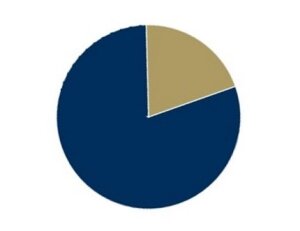
Quick selection: the most important questions at a glance
How does this selection and allocation procedure work?
What are the criteria for the allocation of study places?
What are the quotas?
Where do I apply for a study programme subject to NC?
Nationwide admission restrictions: Medicine, Dentistry, Pharmacy
The allocation rules have changed. The influence of the waiting period has been removed. You can find out which criteria count here. The values can only give you a rough orientation. The University of Jena therefore recommends all prospective students not to be deterred from applying due to admission restrictions.
How does the selection and allocation procedure work?
Within the various quotas, a ranking is formed by means of a point system, in which the applicants are given a rank. The quotas, in turn, are made up of various criteria that are included in the evaluation. The study places are then awarded according to the order of the applicants on the ranking list, which is subsequently determined. If study places are still available or have become available again after the end of the allocation and succession procedures, they can also be drawn by lot among all interested applicants (admission by lot).
What are the criteria for the allocation of study places?
Checkliste
Image: Designed by Freepik / freepik.com- Grade: the average grade of your university entrance qualification (for example Abitur) is largely taken into account in the ranking of the corresponding quotas.
- In the case of ‘Psychology (BSc)’, the criterion ‘profession’ (completed vocational training and professional experience) also plays a role in the allocation.
What are the quotas?
We classify all applicants in different ranking lists and allocate different numbers of places from these ranking lists. In each list, we make offers of admission and then admit as many applicants as there are places available. Those who are highest in the ranking list have the best chances.
Grafik
Graphic: Sophie BartholomeFor the first subject-related semesters of the study programmes with local admission restrictions at the University, places are allocated in a procedure in accordance with the Thuringian University Admission ActExternal link (Thüringer Hochschulzulassungsgesetz; in German only) in conjunction with the Thuringian Study Place Allocation DecreeExternal link (Thüringer Studienplatzvergabeverordnung; in German only) as follows:
- 20% of the places according to the average grade
- 80% of places according to the result of a selection procedure at the university (average grade and waiting period). For BSc Psychology, a completed vocational training and professional experience are also taken into account.
For further information, please see the statutes of Friedrich Schiller University on the selection procedure de (in German only).
Where do I apply for a study programme subject to NC?
Applications for study programmes with restricted admission de are made via the applicant portal Friedolin 2.0. The study places are allocated within the framework of the dialogue-oriented service procedure (German abbreviation ‘DosV’) on hochschulstart.deExternal link. This is a service platform that coordinates applications and admission offers for degree programs with restricted admissions. Registration is also required on hochschulstart.deExternal link.
The portal is also used for the application and central allocation of study places in Medicine, Dentistry and Pharmacy, for which nationwide admission restrictions apply.
University Main Building, Room E065
Fürstengraben 1
07743 Jena
Google Maps site planExternal link
Opening hours:
Mondays (10:00 – 12:00)
Tuesdays (13:00 – 15:00)
Wednesdays (10:00 – 12:00)
Thursdays (13:00 – 15:00)
Fridays (10:00 – 12:00)
You can also use our remote help desk at
www.uni-jena.de/service-ssz
or send us your enquiries by post.
Telephone hours:
Mondays to Fridays
(9:00 – 11:00)
Postal address:
Friedrich-Schiller-Universität Jena
Studierenden-Service-Zentrum
07737 Jena


